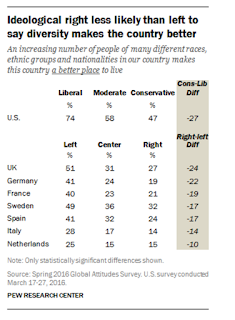I have documented elsewhere that in terms of gender differences, the US stands head and shoulders above the OECD averages. American women are represented at the very top of more industries and sectors than anywhere else and in greater numbers. In any field in the US, you can expect women to be 15-30% of the top performers (by level, station, awards, etc.). Elsewhere in the developed world, women are either unrepresented at the highest levels in large swarths of the economy or fields of endeavor or to a much lesser degree.
Two recent reports shed light on some of the other accusations.
Pew Research has a report, In views of diversity, many Europeans are less positive than Americans by Bruce Drake and Jacob Poushter. Americans are dramatically more tolerant (as measured by positive attitude towards diversity) than any European country.
Click to enlarge.
Not only are Americans as a whole more tolerant, even the much slandered American right are more tolerant. Specifically American Conservatives are more tolerant than 75% of self-identified Liberal Europeans.
Click to enlarge
Well, thank you very much Pew Research for documenting what has been evident for years for anyone willing to depart from the path of ideology and look at reality.
Now what about the claim that Americans have much less social mobility than Europeans and the related claim that the American rich are a cozy club of old-money elite manipulators?
Well, again, the numbers don't seem to back that up. From fascinating research published last year, Investigating the right tail of wealth: Education, cognitive ability, giving, network power, gender, ethnicity, leadership, and other characteristics by Jonathan Wai and David Lincoln. From the abstract:
The extent to which people in the right tail of wealth are highly educated and cognitively able was examined in a sample of 18,245 ultra high net worth (UHNW) individuals with net worth's of USD $30 million plus. How education and ability related to religion, ethnicity, political affiliation, relationship status, country, industry, leadership, gender, net worth, giving, and network power was assessed. And whether gender, religion, ethnicity, or network power differences existed in the right tail of wealth was examined. Overall, these people were highly educated and cognitively able, and smarter (more educated) people were wealthier, gave more, and had more powerful social networks (but when controlling for multiple confounds the association between education/ability and wealth was found to be quite small). Females were underrepresented, and female CEOs needed to be more select to reach the top of a company. Males and billionaires gave the most, but females and UHNW individuals gave more of what they had. U.S. Blacks and self-made females had the highest network power. U.S. Blacks and Caucasians were similarly educated and cognitively able. Democrats had a higher education and cognitive ability level than Republicans. Married people dominated and were the most educated and cognitively able, but least likely to have inherited their money and give. The finance, banking, investment, and internet sectors dominated. Jewish individuals were overrepresented by a factor of about 234. Today, the typical UHNW individual profile includes U.S. married (Christian and Jewish) men who are largely Chairman and CEO, Republican, and earned their money in finance, banking and investments. This study provides evidence for the clustering of brains, wealth and power, and suggests that elite education may matter in the trajectory of developing expertise in wealth and power generationThat's a lot to unpack.
America generates about 25% of the global economic activity with about 4.5% of the global population.
Reading the report, and focusing on Americans, here are the things that leapt out at me.
Among the most successful people in the world (measured by accumulated wealth), Americans are 47% of all UHNW people.It would seem clear from all the above information that if you are an ethnic minority, a religious minority, a woman, come from a modest financial background, or have not been able to crack the inner sanctum of the elite schools, then the country where you are most likely to achieve UHNW status is the US.
The wealthy in America are far more likely to have created their fortunes themselves (rather than inheriting them) compared to Europeans. 12.6% of American UHNWs inherited their wealth whereas purportedly more "socially mobile" European countries have far higher rates of inheritance such as Austria (49.6%), Germany (30.8%), Norway (20%), Denmark (23.1%), Netherlands (19.5%), France (18.2%), Switzerland (24.7%), Sweden (43.8%).
There's not a lot of information about UHNW giving but for which there is, the US UHNWs are second after the British in terms of generosity.
Despite the impression that all rich people are liberal, the data suggests that the older trope that the rich are more affiliated with Republicans is true. There are two groups for whom this is not true. African American UHNW and South Asian UHNW both affiliate with Democrats to a greater degree than they do Republicans but all others are the reverse (Asian, Caucasian, Chinese, Hispanic and Middle Eastern).
In the US, among the religious groups in UHNW, Jews and Episcopalians are the most generous.
While the connection between UHNW and higher education is very strong, the connection with elite schools is relatively weak. 66% of American UHNW did not attend elite schools.
African Americans make up 42% of all black UHNW worldwide (African Americans are about 3.5% of all blacks worldwide.)
Put differently, American women have higher levels of achievement across a broader spectrum of industries and fields than do their international peers, American religious, ethnic, and racial minorities achieve more, the playing field is flatter, the society is more welcoming and the outcomes more fair in the US than anywhere else.
Nice to know, and good to acknowledge while we continue to seek improvement.






No comments:
Post a Comment